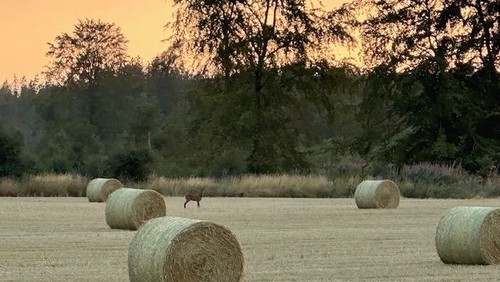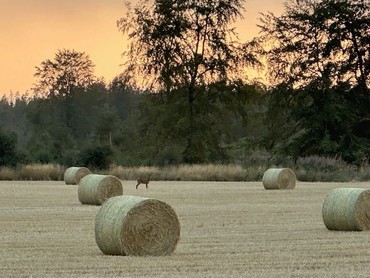
12/10/2025 0 Comments
Thought for the Week - 12 October 2025
Thought for the Week - 12 October 2025
# News

Thought for the Week - 12 October 2025
Readings:
For Trinity 17
2 Kings 5:1-3, 7-15c; Psalm 111; 2 Timothy 2:8-15; Luke 17:11-19
For Harvest
Deuteronomy 26:1-11, Psalm 100, Philippians 4. 14-18, John 6. 25-35
Collect:
For Trinity 17
Gracious God,
You call us to fullness of life:
deliver us from unbelief
and banish our anxieties
with the liberating love of
Jesus Christ our Lord. Amen
For Harvest
Creator God,
you made the goodness of the land,
the riches of the sea
and the rhythm of the seasons;
as we thank you for the harvest,
may we cherish and respect
this planet and its peoples,
through Jesus Christ Our Lord. Amen
Reflection:
We are, at present in the midst of Harvest Celebrations in the Watling Valley. I find Harvest a joyful time and a time of huge generosity as people donate food for the foodbanks. Harvest is traditionally the time when rural communities celebrated and gave thanks for the successful gathered the crops, and to also give thanks for God’s provision for us. There was often a harvest supper (which predates the Harvest Festival) and very often there was, and there still is, a large harvest loaf baked in the shape of a sheaf of wheat for the celebration.
Bread is, and has been for over 14000 years, a staple human food. There is evidence that show that bread has been baked from the Neolithic Era in purpose-built bread ovens. Bread was placed straight into the oven with no tin or baking tray to protect it, and the brought out with a wooden paddle to cool when it was fully baked. This could mean that the base of the loaf could have some ash on it, so in the 15th century, wealthy families, instead of slicing bread vertically, would slice the bread horizontally, with the wealthy family taking the choice top cuts of the bread, thus avoiding the ashy bottom. This is why people from aristocratic backgrounds are sometimes described as the ‘upper crust.’ The idea that some people are more deserving of better cuts of bread than others seems extraordinary, and yet, this has happened across the whole of humankind throughout history, not just the 15th century upper crust. Stratisfying and dividing humans is something that, like bread, goes back to the earliest humans, and the desire to ‘other’ people is as old as history itself. This is something that is particularly pertinent this week in the shadow of the Heaton Synagogue attack last Thursday. We are living in a time of significant division and hate. Intemperate, divisive and aggressive language used about immigration by public figures including politicians at present is contributing to deep divisions within society. This alongside other social groups being excluded, such as the rise in racist incidents, and a rise in people who boast that they are misogynists, or homophobic, are increasing the depth of these divides.
Today’s gospel Jesus is pursued by a crowd looking for signs and wonders. They want to be reassured by what they can see, failing to see that these miraculous signs, like the feeding of the five thousand which immediately precedes the reading, is not an end to itself. That even if he did produce another sign or wonder, maybe it would amaze or encourage, but it wouldn’t last, sooner or later they would need another and another. Signs and wonders are not the answer. Jesus tells the crowd who are eagerly listening, not to put their toil into the food that perishes, but into the food that endures for eternal life. The work that is required is to believe in Jesus. That is where to put our strength and effort, and we will be satisfied, as Jesus tells us in the first of the ‘I Am’ sayings, Jesus says in verse 35 ‘I Am the bread of life’. In Him we will never hunger.
Jesus uses bread, time and time again in his ministry. To feed those in need, such as the five thousand, in the upper room where he breaks bread, and shares is with his disciples, which is of course the basis for Holy Communion, and now, Jesus tells us that he is the bread of life, that only he can give us everything we need, and only though him can we be satisfied.
Bread is used as it is universal. All people who can, do eat bread. From the highest to the lowest, bread is a staple food for nearly all humans. Because all humans have the same basic needs. Bread and water, a roof over our heads, clothes to keep us warm, social networks. There is an old adage, we have more that unites us than divides us. And that is true. In this time of division and hate it is more important than ever for Christians to remember this. That Christ’s love and compassion is for all people, without exception. To look past the difference and to see our sister or brother who stands before us. The Trappist monk, Thomas Merton, once said that as Christians ‘our job is to love others without stopping to inquire whether or not they are worthy’.
So let us go forward, and do our job, and do it well.
Revd Kath Long.


Comments